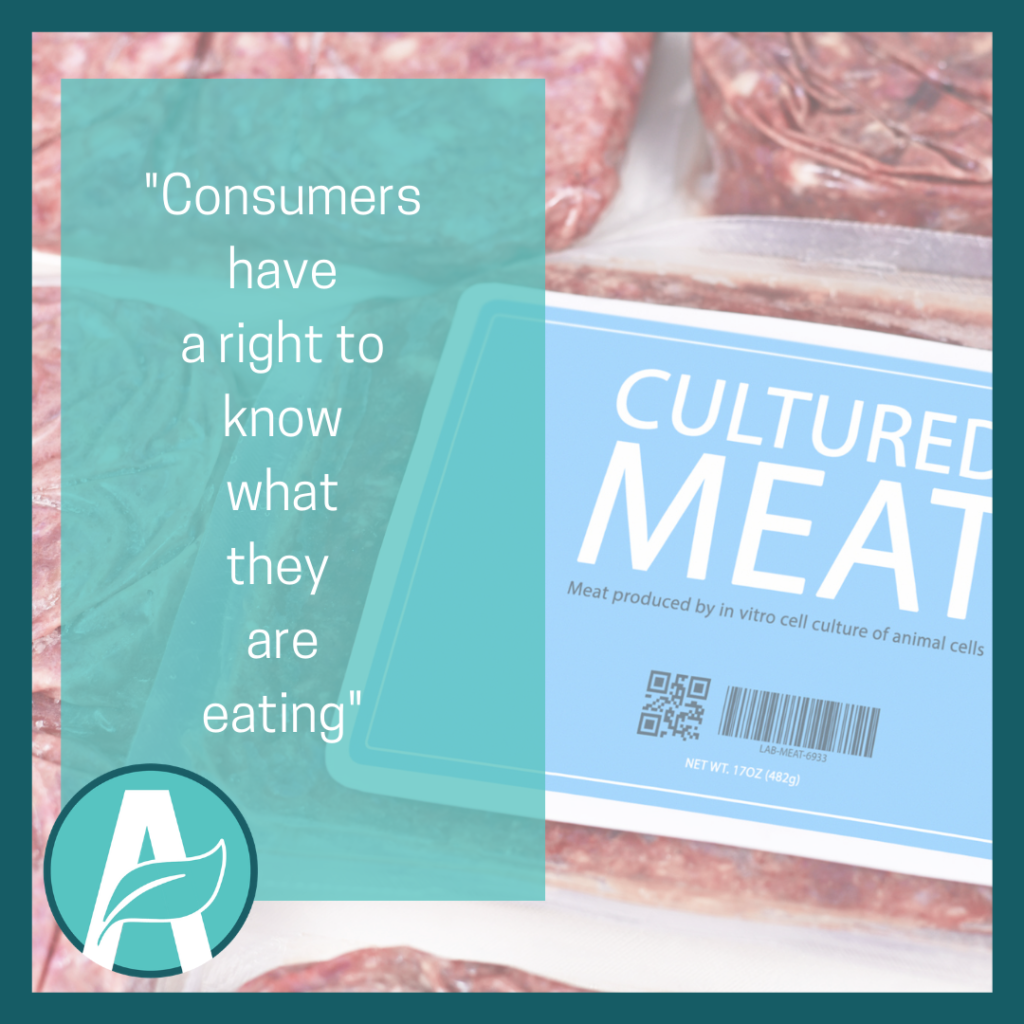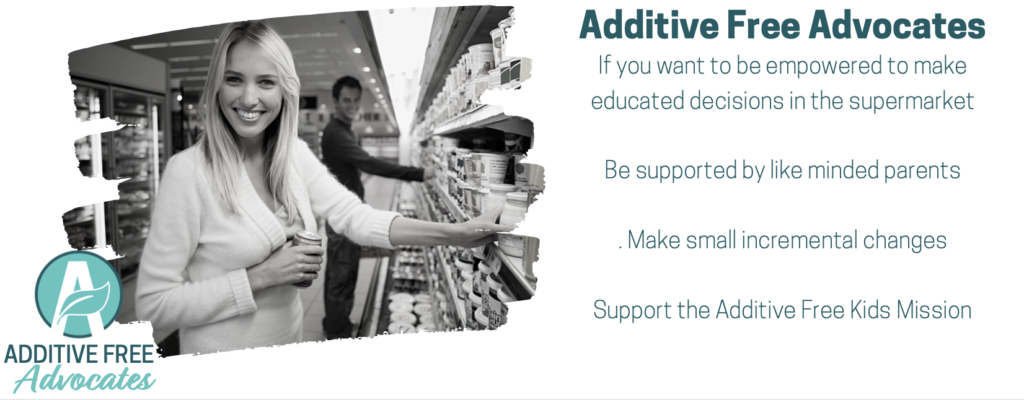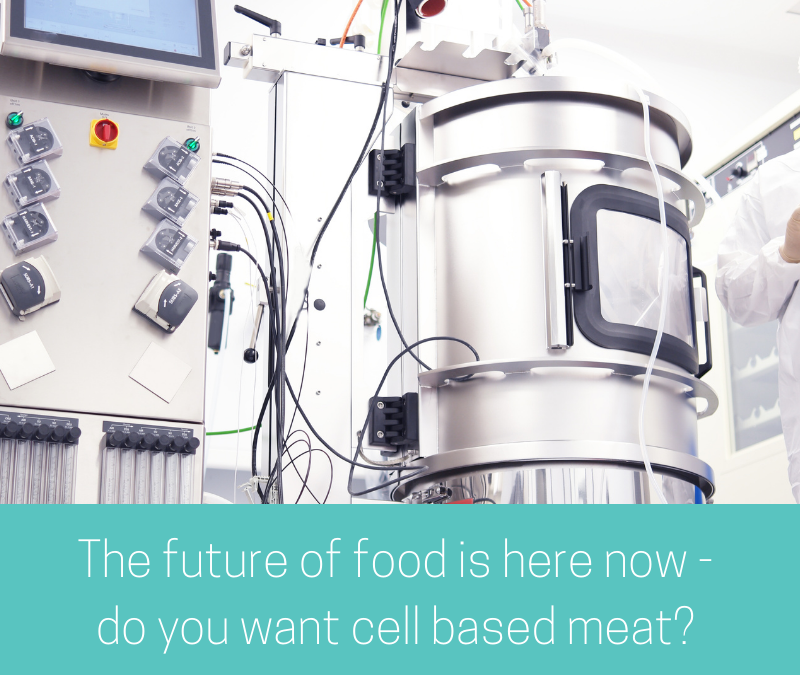It is December 2020, I have read that approval has been given for the sale of “cultured chicken” or “cell based meat” after a “rigorous consultation and review process” in Singapore. One of our lovely Additive Free Advocates alerted me to the news. The approval was granted for cultured chicken to be used as an ingredient in chicken nuggets.
Why is this a big deal?
This is world first, a breakthrough This is the future of cellular agriculture – to take extracted animal cells and turn them into meat.
What is cultured meat?
Cultured meat is ‘meat’ that has been created directly from animal cells in a lab. This is perceived to be a breakthrough for the global food industry. I have so many questions….
Cultured meat is marketed as creating a more secure food supply and less environmental impact. This novel food has had a team of scientists, product developers and regulatory experts to characterise the cultured chicken and the process to produce it.
This sets a precedent for every other country around the world.
How is cultured meat made?
Cultured meat is made by putting primary cells (muscle or fat cells) or stem cells into a culture medium that feeds the cells. “These cells can come from a range of sources: biopsies of living animals, pieces of fresh meat, cell banks and even the roots of feathers” [1]
There is an advantage to using stem cells, as depending on which nutrients are used they can mature into any cell type. Stem cells can be used indefinitely to produce a product.
This medium is then put into a bioreactor to support the cells growth. In the Singaporean example the growth medium includes foetal bovine serum “which is extracted from foetal blood, but this is largely removed before consumption” [3]
In this vat of culture medium, the cell proliferates exponentially. “The resulting meat mush can be formed into a plethora of unstructured items, from patties to sausages – with or without other ingredients added for texture” [2]
In this particular example with the chicken nuggets – 70% is lab grown meat, the other 30% comes from mung bean protein isolate and other ingredients. This meat will be sold under the Good Meat brand.
Consumer trust is paramount
The success of this novel food being adopted boils down to consumer trust. As I am learning more about this novel food, my stomach is turning, but I am not the target market for this product. The target market tends to be “educated, male and young” [2] . As I see it, there is a huge challenge in getting consumers over the line.
There are so many questions that need to be answered before we can achieve trust!
Long way to go….so many questions
There are so many questions that I have..
– what testing has been performed to ensure this is safe for human consumption?
– what long term studies have been performed / will there be any?
– how will these cultured meats, lab grown, cell based meats be labelled?
– what ingredients are in the culture?
– are all the ingredients in the culture synthetic?
– will consumers have direct transparency?
– will restaurants be required to disclose on their menus that cell based meats have been used?
– does this cell based meat impact the gut microbiome differently than to conventional meat?
– should this product even be called meat? At what point does meat become meat? Is it at the cell level? Or only when it has been harvested from a whole animal?
In my opinion there needs to be a clear distinction between “meat” and cell cultured food grown in a lab.
I am not the only one with questions…
Michael Hansen a senior scientist in the advocacy division of the nonprofit organisation Consumer Reports has many concerns too [1]:
– the potential for bioreactor contamination
– transparency on the science
– how are they dealing with cells that spontaneously mutate?
– what are the implications of the fact that immortal cell lines could, with uncontrolled growth be defined as cancer cell lines?
– how does the end product compare compositionally and nutritionally with conventional versions?
So many questions!!
Informed choice, transparency and labelling is critical

As with any novel food or ingredient, consumers have a right to know what they are eating. Consumers have a right to know if they are buying or consuming lab grown meat, cultured meat or cell based meat or whatever label you want to give it. I don’t think it should be called meat though!
How comfortable are you in eating lab created meat? Even if our regulator gives ‘assurance’ that quality controls have been met? That rigorous food safety monitoring has been met?
We already know how many shortcomings exist in our regulatory system for basic foods, let alone novel foods! Check out this blog on the topic.
What are some of your biggest concerns?
Will you be eating it? Let me know below.
[1.] https://www.theguardian.com/food/2020/jan/19/cultured-meat-on-its-way-to-a-table-near-you-cultivated-cells-farming-society-ethics
[2] “Out of the lab and into your frying pan: the advance of cultured meat”. February 27, 2020.
[3] https://www.theguardian.com/environment/2020/dec/02/no-kill-lab-grown-meat-to-go-on-sale-for-first-time, December 2020.
Keep yourself informed and educated
If you would like to be kept up to date with what is happening in the additive free world, join our free Additive Free Kids email list here. If you would like to take it to the next level and take responsibility for the health of your family and educate yourself so that you can make empowered decisions in the supermarket, I invite you to check out our Additive Free Advocates Membership program.


Frankie Bell is the Managing Director of Additive Free Kids, a food coach, mentor and is one of Australia’s leading activists against additives in foods.
Frankie is a mum to 5 boys and has personal experience working through the damaging effects of additives to resolve the multiple health issues and behavioural problems in her own children. It became Frankie’s purpose to help other families achieve the same improvements for their families.
These changes can be overwhelming, especially for time poor parents, Frankie has done all the hard work for families to ensure they have access to additive free food, anytime, anywhere. Additive Free Kids specialises in assisting families to live healthy lives free from additives. See how you can work together with Frankie here.


 My passion and mission is to work with families to reduce the overwhelm when going additive free. Moving to additive free living can bring back peace, calm and joy to families. I know it's possible and I've experienced it first hand with my 5 boys.
My passion and mission is to work with families to reduce the overwhelm when going additive free. Moving to additive free living can bring back peace, calm and joy to families. I know it's possible and I've experienced it first hand with my 5 boys.




No way!
Hi Frankie,
No I will not be partaking in any lab created meat product. To mentionbut a few of many reasons:
– The ingredients products are a combination of GMO derived based mono crops and lab generated synthetics (regardless of weather grown under normal cellular homeostatic environments or through enhanced scientific stimulation).
– All or most of the nutrients are either synthetically developed or ‘added’ to have the claims of nutrient levels, yet neither of these are even close to having bio-availability in the required amounts for human consumption and digestion. (Let’s see how many scientists are on the payroll for their marketing campaigns)
– It under mines and diminished the sustainability of the natural state of farming activities: by increasing the mono-crop usage which has a direct causation to the destructive farming process, which subsequently stems the natural pasturing processes when a farm land is rotated and blended with cross cultural and livestock involvement. Watch the recently made documentary SACRED COW (Dianna Rogers & Rob Wolff)which outlines this in very simple and real scientific terms.
– you cannot replace or add supplementary contents for human sustenance. To try and do this is aligning with all other processed food and chemical additive’s ethos’ which have massive issues with chronic inflammatory disorders, mental illnesses and negative lifestyle existences.
– In plain terms it is not real food, its created as a short cut and is ultimately a money spinner for the large food corporations that hide behind the veal of consumer provider with a smile while holding a Grim Reaper’s Sickle; supported by any Government organisation because it can be taxed.
So many reasons! Thank you for your comments!
I love the information that you provide and the questions you ask are thought provoking and made me think even deeper into this topic!
Thanks as always for the informative blog.
You are more than welcome 🙂
I will definitely not be eating it but I guess there will be a large campaign from animal rights activists promoting it. Why on earth people would eat half of what is already n the supermarkets let alone this product? If you don’t wish to eat animal products, DON’T!! and don’t try to substitute. Either eat meat, or not!
I will not be eating it.
You should also look into the recent approval for cricket (the insect) powder to be added to a whole list of foods. Meal worms were approved a few years ago as an additive to food and now crickets.